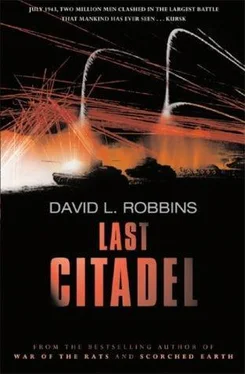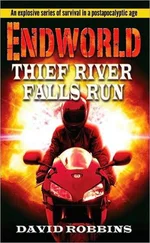He heard his name, ‘Dima, Dima…’ His breathing came hard, steaming with anger, filling his ears. ‘Dima, let me go…’
Other hands took him by the shoulders. They did not tug to peel him away but were gentler hands that told him they were there, careful and frightened. He pushed himself back from his clutch. The face above the throat he gripped was round and red and stupid. Pasha. Pasha had come to wake him. The other boy, Sasha, stood behind Dimitri, speaking. ‘It’s alright, Dima. Dima, calm down, it’s us.’
Dimitri let Pasha’s tunic loose. The boy looked scared and indignant all at once. He rubbed the back of his crewcut where Dimitri had rammed him into the General . ‘What was that about?’ he muttered. Dimitri gave no answer or apology. He slumped away to the back of the tank with the two boys staring after him. He walked a few steps and undid his fly to take a leak. He was dehydrated and could barely piss.
When he was finished, Dimitri gazed up the hill in front of him. He knew this hill, had driven past it a dozen times in the month of war games before the battle. He’d never imagined things would go so badly in the battle that he’d actually have it at his back. This was Hill 260.8, named like every other piece of high ground on the military maps for its metric height above sea level. Hill 260.8 had a commanding view of the approaching steppe. It was the final natural defense before Oboyan. To make sure the Germans and Russians met right here, the Oboyan road cut the hill in half. Six kilometers to the north was the village of Novoselovka. Twenty kilometers beyond that was Oboyan and a straight course into Kursk. Hill 260.8 was in the center of the Red Army’s third and final major defensive belt on the southern front. It was their last stand.
Dimitri kept himself apart from Pasha and Sasha. He bummed a cigarette and a light from a passing soldier, noting the man was with the 3011th Rifle Division. So it was their positions that his torn-up battalion had escaped to in the night. Five thousand foot soldiers dug more holes for themselves a kilometer in each direction across the road, like prairie creatures. The young soldier struck a match for Dimitri and cupped the flame. Dimitri leaned his mouth into the man’s hands. His fingers and nails were clean, his hands did not tremble. He was fresh, still unbludgeoned by the Germans. The man stood while Dimitri inhaled the tobacco, waiting for some word, something brotherly between fighting men. But he was not dirty enough. Dimitri turned his gaze south, across the plain where the Germans would follow in a few more hours, and could not describe for this clean soldier what was going to happen. You’re going to die, Dimitri thought, sucking the cigarette, and walked away as if the man were already a corpse and beyond thanking.
Dimitri smoked while Pasha and Sasha hefted shells into the General’s bins. He let the rising sun warm his face and unbuttoned his coveralls at the chest. He smoked the cigarette down to where he kissed his fingertips to get the last of it. On every side, men labored, vehicles churned, weapons were loaded, but he did not lift a hand. He stood tilting his face into the light. It calmed him to do nothing while many thousands around him worked, it felt like power.
A commissar bustled down the line of tanks, handing out paper sheets. He thrust one at Dimitri with a scowl, then moved on. The paper bore a one-sentence message: ‘The Germans must not break through to Oboyan, at all costs.’ It was sent by General Vatutin, commander of the Voronezh Front, and Nikita Khrushchev, political chief. Dimitri let the page flutter to the ground. He closed his eyes and returned his face to the warm and waiting sky. Yes, he thought. At all costs, of course. We wouldn’t have it any other way.
‘Pick that up.’
Dimitri opened his eyes into his own youthful face glaring at him.
Valentin said again, ‘Pick that up.’
In Valya’s hand, Dimitri saw the same page sent from the general and the apparatchik . He bent and plucked his own sheet from the dirt, as ordered. Valentin stared at him. The boy creased his own page neatly and slipped it into his breast pocket over his heart. Dimitri crinkled the paper in his fist and crammed it in his pocket.
‘Do you have any work to do?’
The boy’s skin was smirched below a white mask around the eyes where his goggles had been. Valya was a better fighter than most, and for that Dimitri was proud of him. But Dimitri was so tired, standing in front of his Communist son, he was frazzled by his black mood and the prospect of another day’s battle. The boy had walked over just to take what small shred of power Dimitri was gleaning from this morning, pretending to be a hetman while others did their chores and he merely watched, an elder, a personage. This is what the Communists do, he thought. They make everyone equal by seeing that everyone obeys. That’s not freedom. Sometimes freedom is to throw the fucking paper on the ground and leave it there. Valya was waiting for an answer. Dimitri looked at his boy and felt himself sinking into Valentin’s equality, where he had no more temper, no miserable mood to call his own, no warm sky to pause under, he was not a hetman . It seemed he’d been fighting everything and everyone, across every tick of the damn clock for years. The tank, the Germans, his fear, his exhaustion – and the one fight he wanted, the one for his son’s soul, he could not take the battlefield, because his son would not call him Papa.
He was so tired.
Dimitri swayed on his feet. What was this? The rider in his heart had gone shaky in the stirrups. The Cossack was about to tumble from the saddle.
Dimitri raised a hand to find steadiness. Valya did not move. So Dimitri caught himself.
And he laughed, a reflex that welled out of him.
‘You’re right,’ he said to his son, chuckling and free again. ‘I have plenty to do.’
Dimitri turned his back on Valya. He went to his toolbox and selected a wrench. He opened the General’s transmission compartment and leaned in to lay his palms on the cool machinery. He tapped the wrench against metal, imitating the sounds of working. After he’d gotten enough grease on his hands to appear that he’d been busy, he lowered the door and tightened it again. He looked around for Valentin and did not find him. He smeared a little oil on his face to add to the film that had grown on him in the past several days. Another soldier hurried by smoking; Dimitri hooked a cigarette from him. He sucked a deep breath, the smoke flooded his blood with a lie of well-being. The soldier jogged off. Dimitri stood in the vast morning, 0700 hours on his watch. He gazed up Hill 260.8, this day the most strategic spot in all of Russia, to be defended at all costs. Dimitri was ready for that, to lay down his life on this road to help trip the Germans walking over it. On every side of him were trenches and earthworks teeming with armed men and boys, manning guns large and small, guns rooted and guns on the move. Around them was the coming battle; on all sides of the battle was the war; and beyond the war was the world and the shape it would take, on and on it spun, into history and eternity and oblivion. It all pivoted around him, Dimitri and his cigarette. This was what Valentin couldn’t take from him, what the Communists could not dominate. This. His spirit. He took one more draft of the cigarette, raised both hands above his shoulders in welcome, and blew a cloud of smoke at the German Stuka fighters droning in high over the steppe from the south. Here they come, he thought. He made a fist and thumped his chest. Sirens sounded. Men ran to their stations, tanks cranked their engines, anti-aircraft batteries pounded from the hill behind him. Dimitri stood alone in the swirl of it all. He thought, before joining the battle, that he had never been lonelier, or sadder, than this.
Читать дальше












